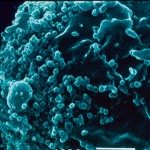Link to Pubmed [PMID] – 2563266
J. Clin. Invest. 1989 Feb;83(2):610-5
HIV-1 infection in vitro of normal bone marrow mononuclear cells (BMMC) depleted of mature T cells was studied. BMMC depleted of either CD3, CD2, or both could replicate HIV-1 irrespective of the presence of macrophages/monocytes. Infected bone marrow cells were shown to differentiate during the culture into CD3+, CD4+, CD8+, and CD1+ cells, whereas noninfected BMMC gave rise to CD3+, CD4+, and CD8+ cells. Moreover, 9-14% of the cells also expressed the viral proteins p24 and gp120 on their surface. Double staining studies revealed that 72 and 83% of the CD4+ cells expressed the gp120 and p24, respectively, suggesting that virus replication occurred in CD4+ cells. T cell colony growth from infected BMMC, either unfractionated or depleted of mature T cells, was impaired in a time-dependent manner, and the differentiation capacity of T cell precursors was abnormal. Colony cells displayed an immature cell phenotype (CD1+ cells) and the viral proteins gp120 and/or p24 could also be detected on CD1+ cells. In addition, pooled colony cells derived from infected CD2- and CD3-depleted BMMC could infect normal mitogen-activated lymphocytes in coculture experiments. These findings strongly suggest that HIV-1 can infect immature bone marrow T cells and be transmitted to the progeny, but the massive viral replication occurs only when the cells differentiate toward CD4+ cells.
